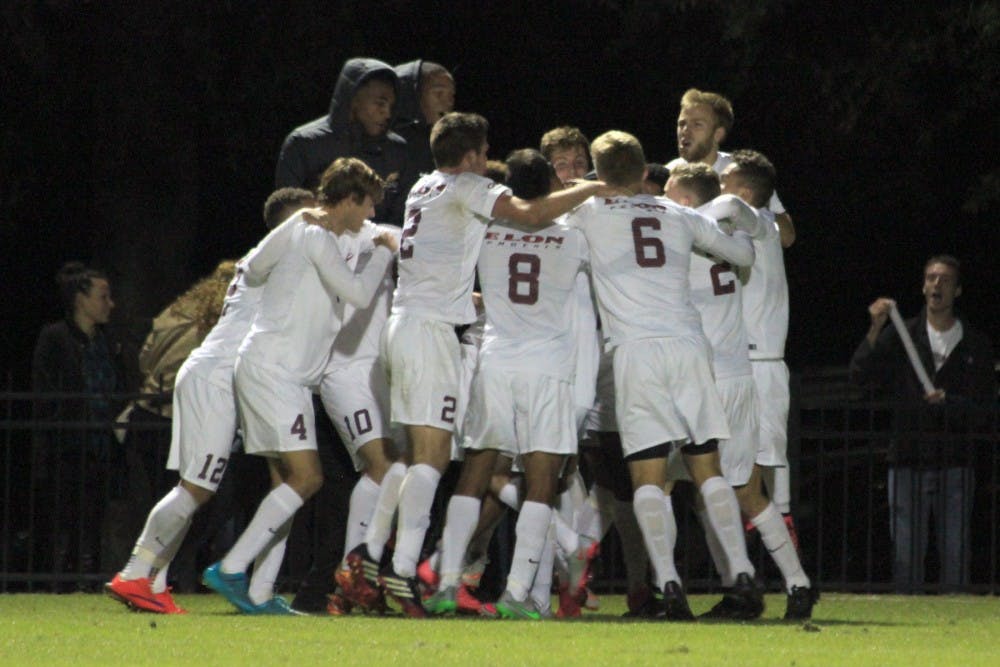Elon University’s head men’s soccer coach Chris Little has a lot to appreciate on the field with 12 wins, the team’s highest ranking in program history earlier this year and longest winning streak to start a season in team history.
But the second-year head coach is always keeping an eye on national rankings and Ratings Percentage Index (RPI), trying to understand where Elon stacks up nationally. Little hopes his team is successful enough to be in position to earn an at-large bid to the NCAA Tournament if it can’t win the Colonial Athletic Association tournament.
“It’s really important to us and it’s always has been to the program,” Little said. “Because why would you put all your eggs into one basket in terms of just winning the conference tournament?”
After back-to-back losses to Duke University and Hofstra University, the Phoenix, 24th in the RPI, no longer is able to earn its way into the NCAA Tournament at Rudd Field. Elon’s loss at Hofstra was particularly damaging, as Hofstra clinched the CAA regular season title and the right to host the final two rounds of the conference tournament. This means Elon will more than likely have to beat Hofstra on its home field to earn the automatic bid in the NCAA tournament.
Out of the 48 teams that qualify for the NCAA Tournament, 24 are the conferences champions from across Division I men’s soccer, and each of those teams receive an automatic bid. The other half of the bracket gets filled with at-large teams, or teams that are considered the top 24 teams that did not win their conference’s automatic bid.
RPI is often one of the main factors in determining the at-large bids to the NCAA Tournament, measuring the team’s winning percentage, the opponent’s winning percentage, and the opponent’s opponent’s winning percentage, which is better known as strength of schedule.
This year, Little has not taken any chances by loading up Elon’s schedule with a talented opposition in hopes of increasing its RPI in 2015.
“RPI influences decisions we make [for our schedule] so when we come to the end of the season, we’re alive on two fronts,” Little said.
Little said there are two kinds of matches that are vital to the team’s RPI: those against top teams and those against struggling teams. Both kinds of games are equally important to Little because a win against a top opponent gives teams bonus points, while a loss to teams in bottom 50 of the RPI rankings yields negative points.
“What’s the point of winning at Wake Forest [University] if we were to lose to a bottom 50 team at home?” Little said.
The Phoenix avoided a home upset with a comeback victory over 188th-ranked James Madison University Oct. 17. Elon has been able to knock off some top teams along the way, with victories over top-ranked Wake Forest and 36th-ranked University of North Carolina at Wilmington. Elon will have another chance for a quality RPI victory in its next match against 41st-ranked Radford University Oct. 28.
While the goal is to have the strongest schedule possible, it’s not an exact science, as some teams don’t turn out to be as strong as anticipated before the season. James Madison was the reigning CAA champion but is currently ranked 188th in the RPI. Lipscomb University and St. Mary’s College of California each won 12 games in 2014, but are ranked outside the top 100.
For Little, the Phoenix hasn’t picked up “negative bonus points” with bad losses. One bad loss could arguably cost any team a chance at the NCAA tournament. Elon got a taste of this last year, as its season-opening defeat to Stetson University (who finished last season 158th in the RPI) may have been the loss that prevented the Phoenix from receiving an at-large bid.
Little reminds the team of big matches that can affect the team’s RPI and calls on them to acknowledge the challenge. He also calls on experienced players to teach the underclassmen and international players the importance of RPI rankings.
“It’s kind of an educational process,” Little said. “A lot of the older players kind of assume that responsibility, and I think they learn through experience. They can sense in [another] player’s mindset and how they’re approaching the game that it’s a big game.”
Aside from aiming to compete on a national and conference level, Little broadens his scope even more when discussing the ramifications of RPI rankings, such as player recruitment.
“We want to attract the best possible players to Elon,” he said. “To attract the best players, [you have to know] they want to play against the best teams.”


